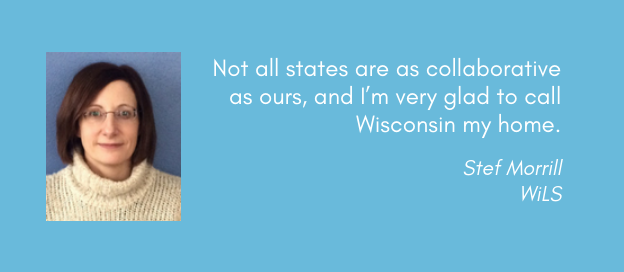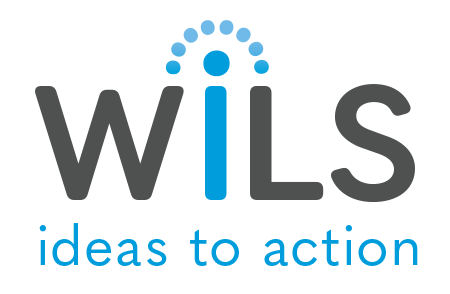
You may have noticed that WiLS has some new faces among its staff. We are excited to grow our skills and improve our services by bringing new members into our team while also leveraging the experience and strengths that our existing team contributes. In the coming months, we will be sharing a little more about WiLS staff members, both new and experienced, in their own words.
This month, we talk with WiLS’ fearless leader and Director, Stef Morrill.
Tell us a little bit about yourself.
When I was a kid in Western New York, I had my own bookcase of books. I was often frustrated that I couldn’t put them in both author and title order at the same time. That was the first clue I would end up in the library world.
I had planned to work in technical services after I got my degree from SUNY Buffalo, but ended up doing SAS programming to generate reports out of a NOTIS system (how’s that for some old school acronyms?) and discovered I had some aptitude for technological things. I moved to Wisconsin and started a career in technology and collaborative librarianship, working for DPI, the South Central Library System, and then WiLS.
I now live in Spring Green with two cats, a raccoon I feed every day, and a bunch of other birds and wildlife.
What do you do in your role at WiLS?
The easy answer is that I’m the director. What I actually DO for WiLS is harder to explain. I just wrote a This Week at WiLS about this topic, urging people to think about what they would do if they had an hour a week to work. If I had just 1 hour, I would focus on solving problems for others, especially for WiLS staff. Thinking through issues with others and creating next steps to keep them moving forward is the part of my job that has the most impact.
Why did you make the decision to do this job?
I knew the value of WiLS as an organization in the Wisconsin library landscape. I also knew that it was going to be an interesting time for WiLS as it transitioned from its role as an OCLC network. I was excited to help set a direction for the organization that would be valuable to members and the community as a whole.
If money or capacity were no concern, what WiLS service would you implement or expand?
If we had infinite resources, I’d love to see WiLS taking on investigation, discussion, and action around big, thorny issues in our profession. There are so many challenges in the information landscape that could cause us problems down the road and that our community could help to solve: How do we collectively combat the questioning of the concept of “fact”? How do we as a society get the information we need when others are manipulating what we see? What does it mean that more and more content is only available through paid providers like Amazon and Netflix?
These are problems that no individual library can solve on their own, yet they will shape our future — both professionally and societally — even if we choose to ignore them. I’d like to see us not just talk and learn about big issues, but figure out what we can do as a community and do it.
What are you listening to or watching or reading right now that’s making you think?
I’ve been listening to Happiness is a Choice You Make by John Leland. (Shameless plug: He’s the first speaker in a lecture series I’ve been working on).
John is a New York Times reporter who spent a year with the “oldest of the old” and wrote this book to share the lessons he learned. I find myself saying “Huh!” a lot and thinking deeply about how we view and treat older people in our society. Older people are just us….but older. We don’t magically turn into something else, but I think we sometimes treat older people that way.
Then again, I’m also reading Tales of the City and thinking a lot about societal norms and what impact the 1970s had on where we are today. Pretty much everything makes me think. It’s a blessing and a curse.
What do you see as a significant opportunity for our members in the next ten years?
I see the potential for us to embrace our traditional roles of information management/dissemination and literacy while also moving forward and adapting to the needs of our current and future society. Libraries can be at the forefront of literacy in all of its forms and for all ages. Whether it’s print literacy for a toddler, information literacy for a student, financial literacy for a young adult, or technology literacy for a senior, we can provide the resources and expertise to help people thrive as things change. As informational professionals, we can learn more and understand how the information landscape is changing and then help those we serve to navigate a course to good information. This feels like a critical need right now, and we could be the ones to help.
Is there anything else you’d like to add?
I’m truly grateful to work for WiLS and to be part of this Wisconsin library community. Not all states are as collaborative as ours, and I’m very glad to call Wisconsin my home.
Stef is awesome. Want to connect with her about a potential project or idea that’s floating around? You can! Send her an email at smorrill@wils.org or you can sign up to receive her weekly newsletter, This Week at WiLS, right to your inbox.
